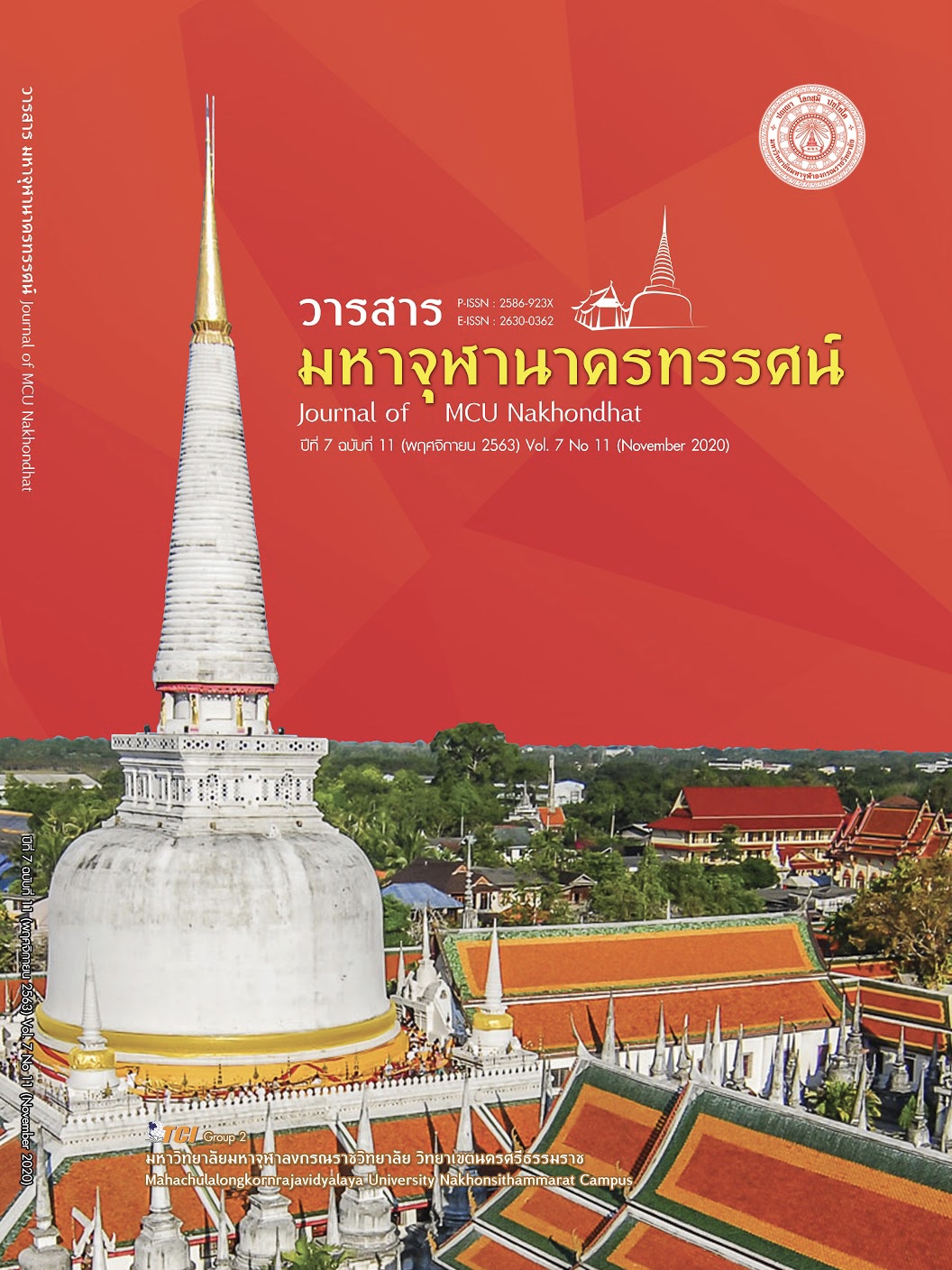DEVELOPMENT MODEL OF ORGANIZATION EFFICIENCY: A CASE STUDY OF BUREAU OF HIGHER EDUCATION STANDARDS AND EVALUATION OFFICE OF THE HIGHER EDUCATION COMMISSION BANGKOK
Main Article Content
Abstract
The objectives of this research were to study 1) the administrative factors, 2) the efficiency of the administration, and 3) the Development Model of Organization Efficiency of the Bureau of Higher Education Standards and Evaluation, The mixed methods of qualitative and quantitative research were utilized in the study. For the qualitative method, the instrument used was the in - depth interview. The key informants were 19 officials of the Bureau of Higher Education Standards and Evaluation.The obtained data was analyzed by summarizing and interpretation of study points. For the quantitative method, the instrument used was a set of questionnaires with a correlation coefficient of 0.88. The population were 86 people randomly selected from the Bureau of Higher Education Standards and Evaluation. The obtained data was analyzed with descriptive statistics, frequency, percentage, mean, standard deviation, t - test, f - test, and Pearson Correlation.The research results showed that: 1) the administrative factors of the Bureau of Higher Education Standards and Evaluation were at high level in all five aspects, namely, strategies, administrative structure, administration and management, personnel, and cooperation of people in the organization. 2) The efficiency of the administration of the Bureau of Higher Education Standards and Evaluation was at high level in three aspects, namely, quality of work, workload, and timing. 3) The Development Model of Organization Efficiency of Bureau of Higher Education Standards and Evaluation, Office of the Higher Education Commission, Bangkok, was the efficiency in the administration by setting strategies, structures, missions, roles and duties. The bureau determined its strengths and weaknesses within the organization and opportunities and threats outside the organization. The action plans describe appropriate allocation of resources and activities. The plans take into consideration the advantages and disadvantages of work such as the quality of work, workload and timing. The bureau adopted detailed policies and objectives gearing towards the targeted goals, especially the increased efficiency of the work.
Article Details
References
เสนาะ ติเยาว์. (2546). หลักการจัดการ. กรุงเทพมหานคร: มหาวิทยาลัยธรรมศาสตร์.
กชพร พุทธจักร. (2553). ปัจจัยที่มีอิทธิพลต่อประสิทธิภาพในการปฏิบัติงานของบุคลากรในโรงเรียนที่จัดการเรียนการสอนของนักเรียนพิการ และนักเรียนด้อยโอกาสจังหวัดอุบลราชธานี จังหวัดยโสธร จังหวัดอำนาจเจริญ และจังหวัดศรีสะเกษ สังกัดสำนักการบริหารงานการศึกษาพิเศษ สำนักงานคณะกรรมการการศึกษาขั้นพื้นฐาน. ใน วิทยานิพนธ์ครุศาสตรมหาบัณฑิต สาขาวิชาการบริหารการศึกษา. มหาวิทยาลัยราชภัฏอุบลราชธานี.
กาญจนา วิสูตรสกุลศักดิ์. (25 ธันวาคม 2562). งานซ้ำซ้อนกับหน่วยงานตัวเองและซ้ำกับหน่วยงานอื่น. (กุณภาณัฐฏ์ สุวรรณนุรักษ์, ผู้สัมภาษณ์)
จันทรานี สงวนนาม. (2551). ทฤษฎีและแนวปฏิบัติในการบริหารสถานศึกษา. (พิมพ์ครั้งที่ 2). กรุงเทพมหานคร: บุ๊ค พอยท์.
ติณชมา ศรีเมือง. (25 ธันวาคม 2562). ความขัดแย้งระหว่างบุคคลกับองค์การ. (กุณภาณัฐฏ์ สุวรรณนุรักษ์, ผู้สัมภาษณ์)
นพพงษ์ บุญจิตราดุลย์. (2557). หลักการและทฤษฎีการบริหารการศึกษา. นนทบุรี: ตีรณสาร.
บุญชม ศรีสะอาด. (2556). การวิจัยเบื้องต้น. (พิมพ์ครั้งที่ 9). กรุงเทพมหานคร: สุวีริยาสาส์น.
ปภาวดี โพธิ์ถวิล. (27 ธันวาคม 2562). การประชุมของกลุ่มงานในองค์การควรมีการจัดประชุมกลุ่มงานทุกเดือนเพื่อรับทราบปัญหา. (กุณภาณัฐฏ์ สุวรรณนุรักษ์, ผู้สัมภาษณ์)
ภิญโญ สาธร. (2518). การบริหารการศึกษา. กรุงเทพมหานคร: วัฒนาพานิช.
วิโรจน์ สารรัตนะ. (2545). โรงเรียนองค์กรแห่งการเรียนรู้ แนวคิดทางการบริหารศึกษา. (พิมพ์ครั้งที่ 4). กรุงเทพมหานคร: ทิพย์วิสุทธิ์.
. (2555). แนวคิด ทฤษฎี และประเด็นเพื่อการบริหารทางการศึกษา. (พิมพ์ครั้งที่ 8). กรุงเทพมหานคร: ทิพยวิสุทธ์.
วิธัญญา จงพิพัฒนสุข. (15 พฤศจิกายน 2562). การจัดโครงสร้างขององค์กรที่ชัดเจนภายในหน่วยงาน. (กุณภาณัฐฏ์ สุวรรณนุรักษ์, ผู้สัมภาษณ์)
ศุภลักษณ์ โอสถานนท์. (25 ธันวาคม 2562). ตัวชี้วัดภาระหน้าที่ความรับผิดชอบยังไม่สะท้อนสมรรถนะของงาน. (กุณภาณัฐฏ์ สุวรรณนุรักษ์, ผู้สัมภาษณ์)
สมาน รังสิโยกฤษฏ์ และสุธี สุทธิสมบูรณ์. (2544). หลักการบริหารเบื้องต้น. กรุงเทพมหานคร: ส้มหวาน.
สัมฤทธิ์ กางเพ็ง. (2551). ศึกษาเรื่องปัจจัยทางการบริหารที่มีอิทธิพลต่อประสิทธิผลของโรงเรียน: การพัฒนาและการตรวจสอบความตรงของตัวแบบ. ใน ดุษฏีนิพนธ์ปรัชญาดุษฎีบัณฑิต สาขาวิชาบริหารการศึกษา. มหาวิทยาลัยขอนแก่น.
สำนักงานคณะกรรมการการอุดมศึกษา. (2562). รูปแบบการพัฒนาประสิทธิภาพการจัดการองค์การด้านการบริหารจัดการองค์การของสำนักมาตรฐานและประเมินผลอุดมศึกษา. เรียกใช้เมื่อ 20 มกราคม 2562 จาก http://www.mua.go.th
สำนักงานคณะกรรมการพัฒนาระบบราชการ. (2550). คู่มือการบริหารการเปลี่ยนแปลงเพื่อเสริมสร้างความเป็นเลิศในการปฏิบัติราชการของหน่วยงานภาครัฐ. กรุงเทพมหานคร: สำนักงานคณะกรรมการการพัฒนาระบบราชการ (ก.พ.ร.).
Harrington Emerson. (1992). The Twelve Principles of Efficiency. New York: The Engineering Magazine.
Hinkle, D. E. (1998). Applied Statistics for the Behavioral Sciences. Boston: Houghton Mifflin.
Max Weber. (1920). German Sociology. Retrieved September 22, 2020, from http://en.wikipedia.org


